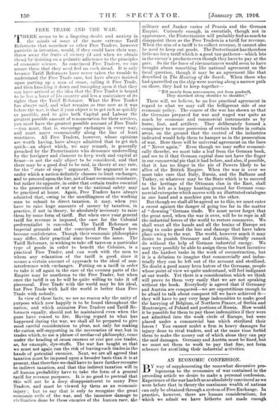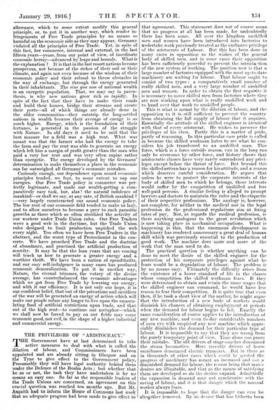AN ECONOMIC CONFESSION. B Y wayof supplementing the somewhat discursive pro-
legomena to the economics of war contained in the preceding article we desire to make a personal confession. Experience of the war hasleft us as absolutely convinced as we were before that in theory the maximum wealth of nations can only be obtained through a system of Free Exchange. In practice, however, there are human considerations, for which we admit we have hitherto not made enough allowance, which to some extent modify this general principle, or, to put it in another way, which render in- fringements of Free Trade principles by no means so harmful on the economic side as they may appear. Germany violated all the principles of Free Trade. Yet, in spite of this fact, her commerce, internal and external, in the last fifteen years—years, from our point of view, of inordinate i economic heresy—advanced by leaps and bounds. What is the explanation ? It is that in the last resort nations become prosperous, not because of the riches of their soil or their climate, and again not even because of the wisdom of their economic policy and their refusal to throw obstacles in the way of exchange, but through the energy generated in their inhabitants. The site qua non of national wealth is an energetic population. That, we may say in paren- thesis, is why new nations grow rich so rapidly. In spite of the fact that they have to make their roads and build their houses, bridge their streams and create their ports—all of which things are already done in the older communities—they outstrip the long-settled nations in wealth because their average of energy is so much higher. Energy, which is the foundation of their fortunes, is generated in the passion of the struggle with Nature. III old days it used to be said that the best manure for a field was a high rent. What was meant was that the farmer who had the energy to take the farm and pay the rent was able to generate an energy which left him a margin of profit greater than the man who paid a very low rent and was very often supine rather than energetic. The energy developed by the Germans' determination to make themselves a place in the economic sun far outweighed all Germany's economic mistakes.
Curiously enough, our dependence upon sound economic principles tended, we fear, to seine extent to sap our energies. Our Free Trade policy in commerce was per- fectly legitimate, and made our wealth-getting a com- paratively easy task, but, alas ! the natural indolence of mankind—or shall we say, at any rate, of British mankind ? —very largely counteracted our sound economic policy. The low rent of our economic field tended to make us lazy, and to allow ourselves to become a prey to such parasitic growths as those which so often sterilized the activity of our workers under Trade Union rules. Our Free Traders wove a good web in the daytime, but the Trade Union rules designed to limit production unpicked the web every night. Too often we have been Free Traders in the abstract, and the worst type of Protectionist in the con- crete. We have preached Free Trade and the doctrine of abundance, and practised the artificial production of scarcity. It may be that the lean years that are coming will teach us how to generate a greater energy and a worthier thrift. We have been a nation of spendthrifts, and our easy self-indulgence in many cases has produced economic demoralization. To put it in another way, Nature, the eternal trimmer, the votary of the divine average, has counterbalanced the economic advantages which we got from Free Trade by lowering our energy, and with it our efficiency. It is not only our hope, it is our confident belief, that out of the privations and sacrifices of the war will be generated an energy of action which will make our people refuse any longer to live upon the emascu- lating food of artificial restrictions upon trade, and that out of the high rent—to continue our metaphor—which we shall now be forced to pay on our fields may come economic good, not evil, in the shape of a higher industrial and commercial energy.



















































 Previous page
Previous page